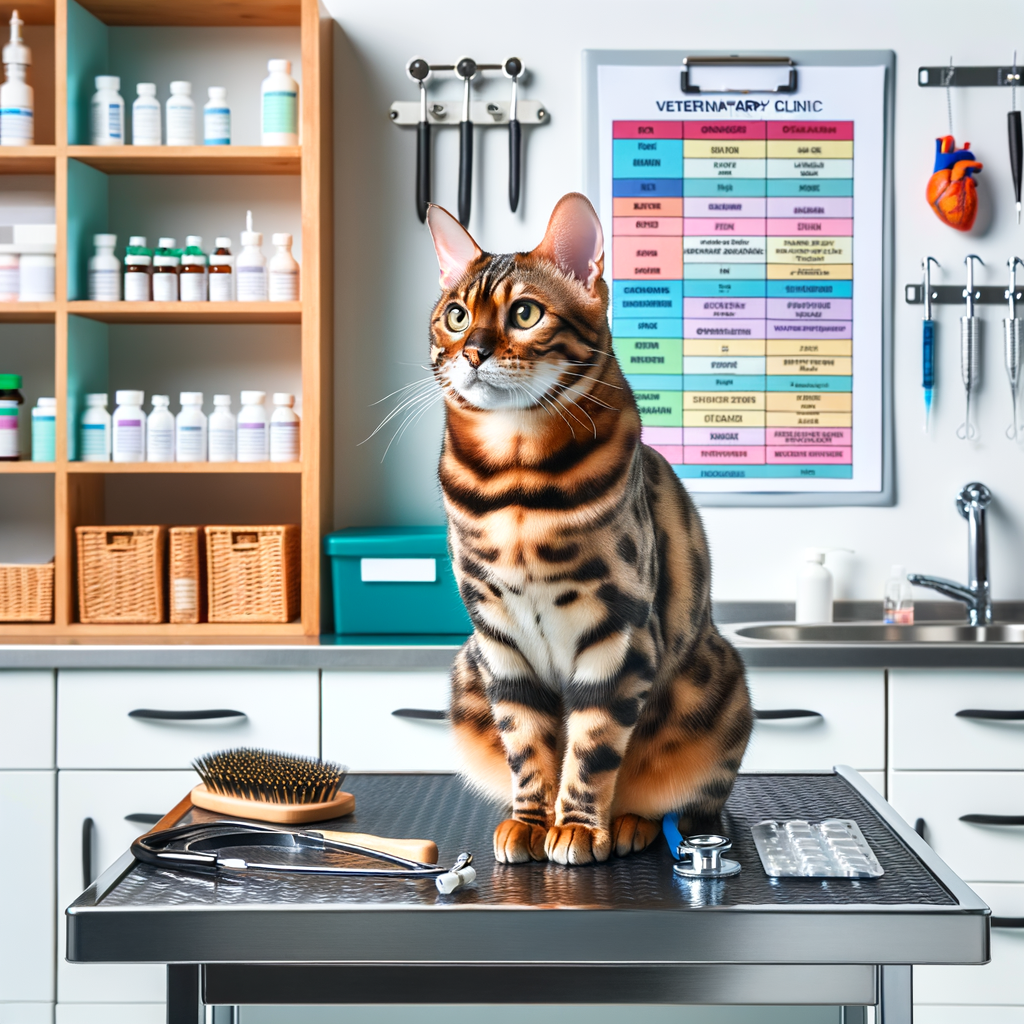
Introduction to Bengal Cat Health Plan
Having a health plan for your Bengal cat is very important. Bengal cats are active and curious. They need special care to stay healthy. A good health plan helps you keep track of their needs. This includes regular check-ups, vaccinations, and a balanced diet. By planning ahead, you can prevent many health issues.
To keep your Bengal cat happy and healthy, follow these wellness tips:
- Regular Vet Visits: Take your Bengal cat to the vet at least once a year. This helps catch any health problems early.
- Balanced Diet: Feed your Bengal cat high-quality cat food. Make sure it has the right mix of proteins, fats, and vitamins.
- Exercise: Bengal cats love to play. Provide toys and climbing spaces to keep them active.
- Hydration: Always have fresh water available. Proper hydration is key to their health.
- Grooming: Brush your Bengal cat regularly. This helps keep their coat shiny and reduces shedding.
Bengal Cat Care Guide
- Essential nutrients for Bengal cats
Bengal cats need a balanced diet rich in protein, fats, and essential vitamins. Protein is crucial for their muscular build. Look for cat food with high-quality meat as the first ingredient. Omega-3 and Omega-6 fatty acids help maintain a shiny coat and healthy skin.
| Nutrient | Importance |
|---|---|
| Protein | Supports muscle growth and repair |
| Fats | Provides energy and supports skin health |
| Vitamins | Boosts immune system and overall health |
- Recommended feeding schedule and portion sizes
Feeding your Bengal cat at regular intervals helps maintain their energy levels. A typical schedule includes:
- Kittens: 3-4 small meals per day
- Adults: 2 meals per day
- Seniors: 2-3 smaller meals per day
Portion sizes depend on your cat’s age, weight, and activity level. Always follow the guidelines on the cat food packaging and consult your vet for personalized advice.
- Special dietary considerations for kittens, adults, and senior cats
Different life stages require different nutrients:
- Kittens: Need more protein and fat for growth. Look for kitten-specific formulas.
- Adults: Balanced diet with controlled portions to prevent obesity.
- Seniors: Lower calorie intake and higher fiber to support digestion. Senior cat food often includes joint supplements.
Always provide fresh water and avoid giving your Bengal cat human food, which can be harmful.
Bengal Cat Exercise Routine
- Importance of regular exercise for Bengal cats
Regular exercise is crucial for Bengal cats. These active felines need to burn off energy to stay healthy and happy. Without enough exercise, they can become bored and may develop behavioral issues.
Exercise helps maintain a healthy weight, which is important for preventing diseases like diabetes and arthritis. It also supports their mental health by providing stimulation and reducing stress.
- Recommended types of exercise and play
Bengal cats love to climb, jump, and chase. Here are some fun ways to keep them active:
-
- Interactive toys: Laser pointers, feather wands, and puzzle toys are great for engaging your Bengal cat.
- Climbing structures: Cat trees and shelves give them a place to climb and explore.
- Fetch: Some Bengal cats enjoy playing fetch with small toys.
- Outdoor time: If safe, supervised outdoor play can be very stimulating.
- Exercise safety tips
While exercise is important, safety is key. Here are some tips to keep your Bengal cat safe during playtime:
-
- Always supervise play with small toys to prevent choking.
- Ensure climbing structures are stable to avoid falls.
- Use breakaway collars if your cat wears one, to prevent accidents.
- Limit outdoor time to a secure area to protect from traffic and predators.
Bengal Cat Veterinary Care
Bengal cats are generally healthy, but they can be prone to certain health issues. Some common problems include:
- Hypertrophic Cardiomyopathy (HCM): A heart disease that affects the heart muscles.
- Progressive Retinal Atrophy (PRA): An eye condition that can lead to blindness.
- Feline Infectious Peritonitis (FIP): A viral disease that can be fatal.
It’s important to know the signs of illness in Bengal cats. Look out for:
- Changes in appetite or weight
- Vomiting or diarrhea
- Coughing or sneezing
- Lethargy or unusual behavior
- Changes in urination or defecation habits
If you notice any of these signs, it’s best to consult your vet.
- When to seek veterinary care
Regular check-ups are essential for keeping your Bengal cat healthy. However, if you observe any of the following, seek veterinary care immediately:
- Persistent vomiting or diarrhea
- Severe coughing or difficulty breathing
- Sudden weight loss or gain
- Unusual lumps or bumps
- Signs of pain or distress
Early detection and treatment can make a big difference in your cat’s health.
Bengal Cat Preventive Care
- Importance of Regular Check-ups
Regular check-ups are vital for your Bengal cat’s health. These visits help catch any health issues early. Your vet can monitor your cat’s weight, teeth, and overall health. According to Wikipedia, regular vet visits can extend your pet’s life.
- Vaccinations and Parasite Prevention
Vaccinations protect your Bengal cat from diseases. They are crucial for keeping your cat healthy. Parasite prevention is also important. Fleas, ticks, and worms can make your cat very sick. Your vet can recommend the best treatments.
- Benefits of Spaying/Neutering
Spaying or neutering your Bengal cat has many benefits. It can prevent certain health problems and reduce unwanted behaviors. It also helps control the pet population. According to Wikipedia, spaying/neutering can increase your cat’s lifespan.
| Preventive Care | Benefits |
|---|---|
| Regular Check-ups | Early detection of health issues |
| Vaccinations | Protection from diseases |
| Parasite Prevention | Prevents fleas, ticks, and worms |
| Spaying/Neutering | Prevents health problems and unwanted behaviors |
Bengal Cat Vaccination Schedule
- Recommended vaccinations for Bengal cats
Vaccinations are crucial for keeping your Bengal cat healthy. The core vaccines recommended for Bengal cats include:
-
- Feline Viral Rhinotracheitis (FVR) – Protects against respiratory infections.
- Calicivirus (FCV) – Prevents a common viral infection.
- Panleukopenia (FPV) – Guards against a severe and often fatal disease.
- Rabies – Required by law in many areas and protects against a deadly virus.
- Vaccination schedule for kittens, adults, and senior cats
Following a proper vaccination schedule is essential for your Bengal cat’s health. Here is a suggested timeline:
| Age | Vaccination |
|---|---|
| 6-8 weeks | FVR, FCV, FPV (first dose) |
| 10-12 weeks | FVR, FCV, FPV (second dose) |
| 14-16 weeks | FVR, FCV, FPV (third dose), Rabies |
| 1 year | FVR, FCV, FPV (booster), Rabies (booster) |
| Every 1-3 years | FVR, FCV, FPV (booster), Rabies (booster) |
- Importance of keeping vaccinations up-to-date
Keeping your Bengal cat’s vaccinations up-to-date is vital for several reasons:
- Prevents Disease – Vaccinations protect against serious and potentially fatal diseases.
- Community Health – Helps prevent the spread of diseases to other pets and humans.
- Legal Requirements – In many places, rabies vaccination is required by law.
- Peace of Mind – Ensures your cat is protected and healthy.
Regular veterinary visits will help you stay on top of your Bengal cat’s vaccination schedule. Consult your vet for personalized advice.
Bengal Cat Grooming Tips
-
Proper Grooming Techniques for Bengal Cats
Grooming your Bengal cat is essential for their health and happiness. Start by brushing their coat at least once a week. This helps remove loose fur and prevents matting. Use gentle strokes to make the experience enjoyable for your cat.
Don’t forget to check their ears for dirt and wax. Clean them with a soft, damp cloth. Also, trim their nails every few weeks to keep them from getting too long.
-
Recommended Grooming Tools and Products
Using the right tools makes grooming easier. Here are some recommended items:
Tool/Product Purpose Slicker Brush Removes loose fur and prevents matting Nail Clippers Trims nails to a safe length Ear Cleaner Keeps ears clean and free of wax Cat Shampoo Keeps the coat clean and shiny -
Benefits of Regular Grooming
Regular grooming has many benefits for your Bengal cat. It helps keep their coat healthy and shiny. Grooming also reduces shedding and prevents hairballs.
Moreover, grooming is a great way to bond with your cat. It gives you a chance to check for any skin issues or parasites. Regular grooming can help you catch health problems early.
Conclusion: Ensuring Your Bengal Cat’s Health and Happiness
Caring for a Bengal cat requires dedication, but the rewards are immense. These beautiful cats are not only stunning to look at but also have vibrant personalities that bring joy to any home. By following a comprehensive health plan, you can ensure your Bengal cat lives a long, happy, and healthy life.
Remember, the key to a happy Bengal cat is a combination of proper nutrition, regular veterinary care, and lots of love and attention. Your Bengal cat will thrive in an environment where they feel safe, loved, and engaged.






